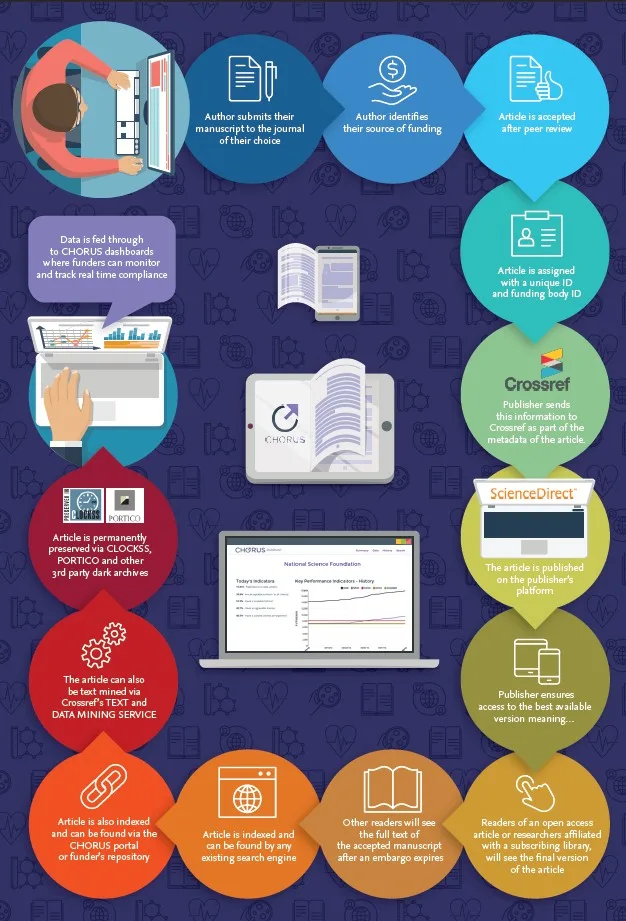CHORUS
Originally developed as a response to a memo issued by the White House Office of Science and Technology Policy, the CHORUS service leverages existing infrastructure to help with the access, compliance, discovery and preservation of peer-reviewed articles.

Elsevier is a founding member of CHORUS and, along with fellow publishers, actively developed and piloted the CHORUS service to provide a low cost compliance service for open access.
How it works
CHORUS is designed to address the critical pain points of providing open access by:
Increasing compliance
Accessing the best available version of an article
Maximizing the benefit from existing, proven infrastructure
Avoiding duplication of effort
Providing transparent reporting and tracking for funders and institutions
CHORUS utilizes publishers’ infrastructure for access to full-text and partners with dark archives CLOCKSS and Portico to ensure long-term preservation of scientific and medical research. It also provides participating funders and institutions with dashboard reporting in order to monitor and track compliance.

CHORUS when publishing with Elsevier
View full sized infographic abre em uma nova guia/janelaSupported partners
At Elsevier, all journals participate in CHORUS for researchers affiliated with participating agencies and universities. In 2016, we made over 3,000 accepted manuscripts available for US-partner funding agencies as part of the CHORUS service. Currently, we support:
US National Science Foundation
US Department of Defense
US Department of Energy
Smithsonian Institute
US Geological Survey
National Institute of Standards and Technology
US Department of Agriculture
Pilots in the US with the University of Denver and University of Florida
Pilots in Japan with the Japan Science & Technology Agency and with the University of Chiba
Pilots in Australia with the Australian Research Council and La Trobe University
In practice, this means we host the open manuscript on ScienceDirect, making these publicly accessible after the embargo period expires. We also provide free Scopus access to pilot universities.
Frequently asked questions
Access will be to the author manuscript version of an article after the journal specific embargo period. If a user is affiliated with a subscribing institution they will see the final version of the article, the best available version and not the author manuscript.
Yes, all Elsevier journals have a standard embargo period. The full list is available here abre em uma nova guia/janela. Please note there are some funding body exceptions where shorter embargo periods apply. Please see our agreements section.
The download version can be used under the terms of the Elsevier user license. A comparison of licenses can be found on our open access license page.
Authors can find the full list of participating funders on the CHORUS Funder Participants abre em uma nova guia/janela page.
No, The aim of CHORUS is to widen access, compliance, discovery and preservation of peer reviewed article. Anyone located in any country can freely access the content.
CHORUS is piloting a number of new initiatives to extend its services to institutions. Research data is something that is also being considered at this moment - although currently, there are no formal pilots.